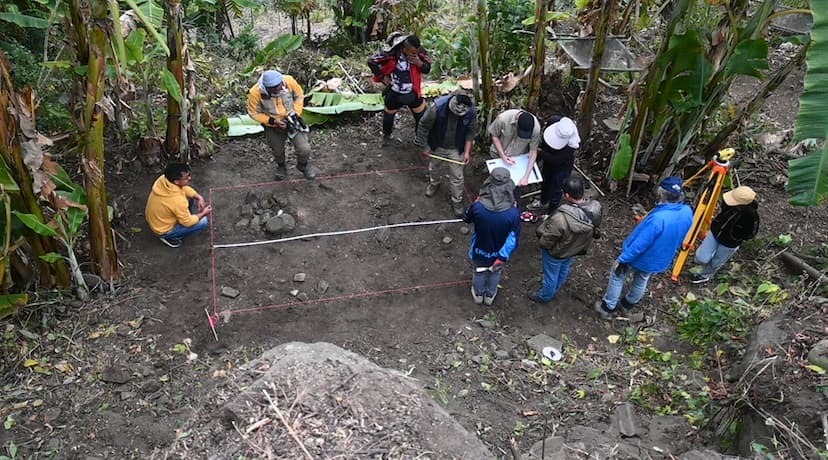Nagaland University Researchers’ uncover great strategies

Nagaland University is conducting archaeological research of Prehistoric Life of Naga communities, seeking climate change mitigation strategies that can aid in providing food security in the present in Nagaland.
This study covers Holocene and Anthropocene geological time periods.


Core concept
These practices not only acknowledge local ownership rights but deeply enrich the scientific inquiry.
The core of this project is archaeology and palaeoclimate research towards establishing a basic understanding of the history of Naga life from earliest times to the recent past.
To date, little work has been done in this field and the story of the deep Naga past is fragmentary, lacking details and a well-dated chronology.

Sites
The team is studying two kinds of sites – Prehistoric sites where they hope to find clues to the pre-agricultural past and the Naga ancestral village sites, mostly lying beneath modern village settlements.
These ancestral sites represent pre-colonial indigenous occupation and serve as a collective memory for groups of descent, for example, as part of narratives of group migrations from prominent sites of dispersal, say researchers from Nagaland University.
Funding
This community-driven multi-disciplinary study is funded for four years (2025-2028) by the Australian Research Council, a Commonwealth organisation within the Australian Government.

It is a collaboration between Nagaland University, University of Sydney, La Trobe University, University of York and the Birbal Sahni Institute of Palaeosciences, Lucknow, with the local government support from the Department of Art and Culture, Government of Nagaland.
Outcome
The outcomes of this project will include targeted information for the communities in which the team works, a large number of scientific publications, and wide-ranging community dissemination of key recommendations for actions towards sustainability across Nagaland, say sources from Nagaland University.
Research team
This project is being led by a team of researchers headed by Prof. Tiatoshi Jamir, Department of History and Archaeology, Nagaland University and includes Dr. Anil Pokharia, Birbal Sahni Institute of Palaeosciences, Prof. Alison Betts, University of Sydney (Australia), Dr. Rebecca Hamilton – University of Sydney (Australia), Dr. Nicholas Fuller, University of Sydney (Australia), Dr. Michael Spate, La Trobe University (Australia), Dr. Hayley Saul, University of York (UK) and Dr. Oliver Craig – University of York (UK).
Importance
Prof. Alison Betts, The University of Sydney spoke about the importance of this research.

“We work with communities to uncover the deep history of their villages, to see how their food systems have changed through time and to identify any past adaptations they may have made to altered climatic conditions.”
Using this knowledge and wider scientific studies, our research will include suggestions and advice that may assist Indigenous communities towards further adaptation in the face of an increasingly environmentally unstable future, said Prof Alison.

Langa was abandoned at some point in the historical past and has only recently been reoccupied. The village elders provided their own oral history of the first establishment and the reasons for abandonment, he said.
‘Excavations have uncovered the remains of an earlier village settlement.’
As part of our work targeted towards public outreach, we have produced a short community archaeology film documenting the traditional oral history of the village and the archaeology of this ancestral site with the collaborative efforts of the local communities of Langa, Kuthur, and Yimkhiung Tribal Council (YTC).
Further study of a similar nature is also on-going at New Phor (Burakha), Meluri District with the support of the local community of New Phor and Pochury Hoho, said Prof Tiatoshi of Nagaland University.
Multi-disciplinary approach
The project is a pioneering multi-disciplinary approach to the study of the past, community engagement, agriculture and sustainability. It is innovative and unique in its structure, but it may act as a model for similar work elsewhere, say sources from Nagaland University.
The study of the past to inform the future is an increasing trend in academic research, particularly in light of diminishing ecosystems, the loss of traditional knowledge, and the urgent need to develop sustainable food security in the face of impending dramatic environmental change, say sources from Nagaland University.
Need for the study
Nagaland has a long, rich history of sustainable agricultural practices, built on hundreds of years of complex management and a wealth of traditional knowledge.
Today, changes are coming with younger generations leaving the villages and long-term agricultural systems under increasing threat from unpredictable and potentially damaging climatic events, say sources from Nagaland University.
The age-old jhum system (slash-and-burn farming) has been criticized for its supposed environmentally damaging practices of forest clearance and burning.
This viewpoint has recently been challenged through new scientific studies, which suggest that cyclical cultivation systems are vital for natural biodiversity, genetic agro-diversity, resilience to extreme weather, mitigation of crop homogenization and social stability.

Mapping shifts in ancient economic practices to climatic sequences will show how people have responded in the past to challenges of fluctuating climatic conditions, say sources from Nagaland University.
Studying
Team members will study the residues of ancient pottery to determine past culinary practices. Soil studies will recover phytoliths, unique microscopic silica bodies formed in vegetation that can indicate the presence of identifiable plant species.
Charred plant remains will provide samples for radiocarbon dating to establish a historical timeline of change and development. The nutritional value of the various elements of the Naga diet will be studied to examine the health implications of traditional techniques for preserving foods.
Also Read – Top 21 IITs in India in 2024: 2024 NIRF Ratings
S Vishnu Sharmaa now works with collegechalo.com in the news team. His work involves writing articles related to the education sector in India with a keen focus on higher education issues. Journalism has always been a passion for him. He has more than 10 years of enriching experience with various media organizations like Eenadu, Webdunia, News Today, Infodea. He also has a strong interest in writing about defence and railway related issues.






